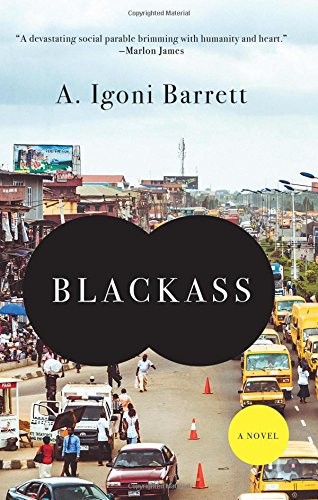
Blackass
A Novel
کتاب های مرتبط
- اطلاعات
- نقد و بررسی
- دیدگاه کاربران
نقد و بررسی

January 4, 2016
On the morning of a long-awaited job interview, Furo Wariboko, a black Nigerian, wakes to find that he’s white. Rushing out of the house to avoid being seen, Furo ends up trekking across Lagos’s traffic-choked sprawl, sans phone, money, or an explanation for why he looks white and sounds Nigerian. But as he soon discovers, being an oyibo, or light-skinned person, comes with significant perks. Watching Furo as he shifts from trying to cope with his new circumstances to trying to profit from them is compelling, and Syreeta, who picks Furo up in a mall and invites him to share her sugar daddy–funded apartment, is a memorable character. For Americans unfamiliar with Nigeria, Lagos functions as another character in the book, a fascinating and chaotic megacity populated by people trying to move up in the world—some honestly, some less so. It’s no coincidence that Furo’s new job is selling self-help books. All this would be plenty, but Barrett, initially in the book as a bystander from whom Furo cadges a drink, becomes more central, as he too begins to undergo a transformation. The problem is that this second transformation—complete except for one key detail—feels less organic, more like a literary device. Nevertheless, Barrett’s debut novel is an original take on both metamorphosis and The Metamorphosis.

January 1, 2016
A Nigerian man wakes up white in Barrett's (Love Is Power, or Something Like That, 2013) satirical update on Kafka's The Metamorphosis. The morning of a job interview, Furo Wariboko arises to find he's become white overnight, this in a modest section of Lagos where many residents have "never seen red hair, green eyes, or pink nipples except on screen and on paper." Unwilling to face his parents, with whom he lives, he sneaks off to Haba!, a company that sells business books, where he's promptly hired as a marketing executive, despite only applying to become a salesperson. Soon he's living with Syreeta--a suspiciously generous woman who, Furo suspects, knows "the going value of a white man in Lagos"--and conspiring to obtain a new passport, necessary to start work. Barrett is at his best depicting small moments of racial unease: a fraught negotiation with a cab driver who assumes Furo has more money than he does, a back and forth with a clothing salesman that becomes dramatically less strained once it's revealed Furo speaks "pidgin like a trueborn Nigerian." But too often the plot isn't as rich as the premise. Furo's dealings with a writer, conspicuously named Igoni and suffering identity problems of his own, end up distracting from the main story rather than complementing it. A promising twist involving Furo's sister's burgeoning career as a Twitter personality is abandoned too quickly. Most frustrating, Barrett waits until the novel's final third for Furo to begin his new job, a tactical error given the rich opportunities for conflict that emerge once he's there. Still, Barrett's prose is consistently entertaining, and though the ending leaves something to be desired, readers will have plenty of fun getting there. The story doesn't quite live up to its brilliant premise, but readers in search of an incisive observer of contemporary life will find one in Barrett.
COPYRIGHT(2016) Kirkus Reviews, ALL RIGHTS RESERVED.

November 1, 2015
A young Nigerian wakes up white in this Kafkaesque comedy--white, except for his, ahem, ass.
Copyright 2015 Library Journal, LLC Used with permission.

February 1, 2016
One morning, Nigerian Furo Wariboko wakes up as a white man, with one exception. Only his girlfriend sees that his rear end is black (she laughs uproariously). His hair and features, in spite of the idiom in which he speaks, make him unidentifiable as a Nigerian. Despite Kafkaesque elements, this book is not an out-and-out satire. In fact, it is a fairly straightforward story of life in today's Lagos. Indeed, it shows that having white skin is an advantage, even in virtually all-black Nigeria. The opposite, of course, is equally true. Furo, who assumes the name Frank Whyte, takes a job he owes to his new whiteness as, of all things, a book salesman. Flipping the premise of John Howard Griffin's Black like Me (1961), Barrett reaches largely the same conclusions about the pernicious effects of skin color on our perceptions of one another. Following his well-received story collection Love Is Power, or Something Like That (2013), this novel further establishes Nigerian Barrett as an important voice in African fiction.(Reprinted with permission of Booklist, copyright 2016, American Library Association.)

























دیدگاه کاربران